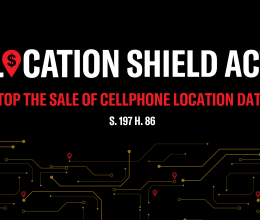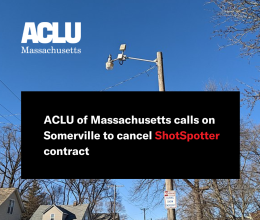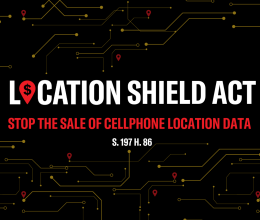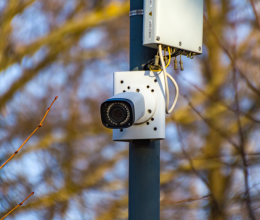
Mass. high court requires warrants for stingray, GPS phone surveillance
Blog by Kade Crockford, director of the Technology for Liberty Program at the ACLU of Massachusetts
In June 2018, the United States Supreme Court issued a landmark digital privacy ruling, holding that police must obtain a warrant before asking our cellphone companies to turn over information showing where we’ve been in the past. In that case, Carpenter v. US, police had obtained—without a warrant—cell site location information revealing Mr. Carpenter’s movements over a period of several months. The ACLU represented Mr. Carpenter, arguing that this surveillance constituted a violation of his Fourth Amendment rights. In his opinion for the majority, Chief Justice John Roberts was careful to note that the Court’s decision was a narrow one, applying only to law enforcement surveillance of historical location information. The facts before the court in Mr. Carpenter’s case did not involve warrantless, real time cell phone location tracking, Roberts wrote, and therefore the constitutionality of that method of digital surveillance would be decided on a different day.
For the people of Massachusetts, that day has arrived.
Today, in a momentous victory for the privacy and liberty interests of people across Massachusetts, the Supreme Judicial Court—the state’s highest—extended warrant protections to real time surveillance of cell phone location information.
There are numerous ways law enforcement can track our physical locations using digital technologies. Today, because most people carry their cellphones with them everywhere they go, and because it’s cheap and easy for law enforcement to track them, cellphone tracking is the most common.
In most states, lawmakers have failed to update the law to require warrants for cellphone location surveillance. Congress likewise hasn’t updated federal privacy law to reflect our new digital reality. So the courts have stepped into that void, and, over the years, have steadily applied warrant protections to 21st century forms of surveillance and tracking.
Ever since June 2018, when the Supreme Court issued its ruling in Carpenter, police nationwide have been required to go to a judge to get a warrant before demanding seven or more days of historical cell site location information. This is data collected and retained by cellphone companies for business purposes—for example, it can help companies determine where to place more cellphone towers. (Thanks to years of ACLU litigation at the state level, starting with the landmark Commonwealth v. Augustine, Massachusetts residents have since 2014 benefitted from a warrant requirement guarding our historical cellphone location information.)
But until today in Massachusetts, there was no law on the books that required police to get a warrant to track our phones in real time. Today’s ruling changes that, clarifying that real time GPS surveillance of a cellphone constitutes a search under the state constitution, the Declaration of Rights.
Real-time GPS tracking: You’re gonna need a warrant for that
In the case at issue, Commonwealth v. Almonor, the government suspected Mr. Almonor of involvement in a homicide. Police obtained Mr. Almonor’s cellphone number, and reached out to the cellphone company, asking them to “ping” the target phone to discover its real time location. The phone company complied, and told police where they could find Mr. Almonor’s phone. Police later found Mr. Almonor, a weapon, and a bulletproof vest in a house in the vicinity of the GPS ping. At trial, Mr. Almonor filed a motion to suppress the evidence police seized from the house, arguing that law enforcement had violated his constitutional rights by demanding the cellphone company snitch on his real time location absent a warrant or a showing of probable cause.
The Supreme Judicial Court held in Mr. Almonor’s favor, explaining that “society reasonably expects that the police will not be able to secretly manipulate our personal cell phones for any purpose, let alone for the purpose of transmitting our personal location data.” Because this “extraordinarily powerful surveillance tool finds no analog in the traditional surveillance methods of law enforcement and therefore grants police unfettered access ‘to a category of information otherwise unknowable,’” the state constitution requires judicial oversight in the form of a warrant.
(The ruling benefits the rest of us, but it actually doesn’t help Mr. Almonor. While the Court agreed with Mr. Almonor that the real time tracking of his cellphone constituted a search, and was therefore protected by article 14 of the Massachusetts Declaration of Rights, it denied his motion to suppress the evidence, holding that the specific facts of the case showed police could have lawfully performed the search without a warrant due to “exigent circumstances.”)
Not so narrow this time: Mass. High court requires warrant for stingray surveillance
Crucially, the ruling takes a different approach from the Supreme Court’s Carpenter decision in one key respect: Instead of confining its mandate to the narrow circumstances of the case before the Court, the ruling extends the warrant protection to other types of real-time cellphone tracking, including where the government uses its own technology rather than requesting the assistance of cellphone companies. In a huge victory for Massachusetts residents, the ruling explicitly specifies that it additionally applies to law enforcement’s use of so-called “stingrays,” also known as cell-site simulators, or devices that police can use to directly track cellphones—enabling police to cut out the cellphone company from the equation entirely.
“We recognize that the government's ability to compel a cell phone to reveal its location is not limited to the pinging that occurred in this case,” the Court held. “For instance, law enforcement in other jurisdictions have used "cell site simulators" to track down persons of interest by "trick[ing] all nearby phones" into revealing their location information…Nor do we doubt that as technology continues to advance, the government will develop new ways to compel an individual's cell phone to reveal its location. The privacy concerns raised by pinging a cell phone apply equally to any circumstance where the cell phone's location information is generated as a direct result of the government's manipulation of an individual's cell phone. [Emphasis mine.]”
The ruling in Almonor today is yet another sign that courts in Massachusetts and across the nation are increasingly aware of how digital technology tips the scales in the balancing test between the government’s authority to investigate crimes and our rights to be free from government interference in our private affairs. Once again, the Massachusetts SJC affirmed that digital is different. Going forward, if police in Massachusetts want to track our cell phones, they’re almost always going to need a warrant to do it—no matter if the surveillance is historical, real time, or involves a police stingray device.
Related content


ACLU applauds new landmark data privacy legislation
May 6, 2024
ACLU of Massachusetts calls on Somerville to cancel ShotSpotter...
March 14, 2024
Cellphone location data used to target abortion misinformation to...
February 13, 2024
Lawmakers file bill to ensure the responsible use of robots
September 13, 2023
Advocates, experts call on lawmakers to ban sale of cellphone...
June 26, 2023
Reproductive advocacy groups launch campaign to bolster patient...
June 14, 2023
Ban The Sale of Location Data
June 2, 2023